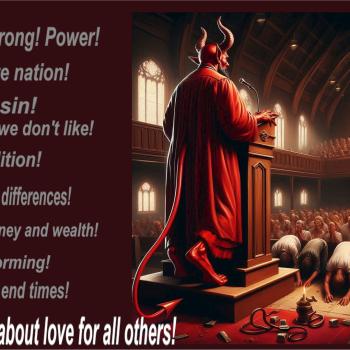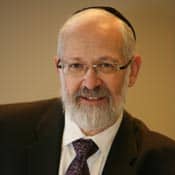First, the shock and disbelief. An 8-year-old boy, walking home alone for the first time from an urban camp, is reported missing. Two days later, his murderer leads police to several places, including his refrigerator, where they find Leiby Kletzky's dismembered remains. The Orthodox Jewish community in Brooklyn cannot believe the outcome. The shock is compounded by the discovery that the murderer came from its own ranks.
This is a community that has its sinners among its saints, but has virtually no violent crime, certainly not murder. It is a community that puts aside its internal differences, and proudly bands together in times of crisis. The local CBS anchor wrote on his blog that he had never seen a search effort of this magnitude, as over 3,000 volunteers worked around the clock, hoping that there would be a happy ending to every parent's worst nightmare.
In the end, it was not the volunteers who found Leiby, but brutally efficient police work. Scouring neighborhood surveillance cameras, the police traced Leiby to a car he had entered. Other cameras identified the car, leading to a dentist's office. A middle of the night call to the dentist got police to the list of all who had visited the office, and the police knocked on doors—until they found the killer.
The story riveted the attention of the city and beyond, even before the grizzly ending. The disappearance of any child—an altogether too frequent event—elicits plenty of pathos. This story was watched more closely because it had elements of the unusual and unexpected: a cherubic Chassidic child, a mass mobilization of search personnel, a look into a community that is often opaque to outsiders. Members of other communities stopped Orthodox-looking Jews on the street to express their support and concern. Neighborhood Catholic, Asian, and Pakistani organizations joined in the search.
With the grim discovery of what had happened to Leiby, the grieving began. Leiby's father inspired a world that listened for bitterness in his voice. Instead they heard his thanks to G-d for the eight years he and his wife enjoyed the company of their precious only son. Mayor Bloomberg and the Chief of Police paid a shiva call—a visit to the seven-day long house of mourning.
Now other work had to begin. The fears of tens of thousands of children had to be dealt with sensitively and appropriately. What would parents tell their children about safety, about walking home alone? Levi Aron, the murderer, had a troubled background. Would a community known for its hospitality now learn to shut its doors to anyone whose behavior seems "different" for fear that he or she might be a latent psychopath? Community leaders quickly put together town-hall meetings dealing with these issues, and presided over by rabbis and psychologists.
Community rabbis could not agree about what lesson or lessons to take to heart. This deeply religious community always strives to find a message in tragedy. Recognizing that humans are given freedom of will by G-d to make horrible choices, Orthodox Jews nonetheless have perfect faith in G-d's ability to protect them from mishaps if He so chooses. No one second-guesses G-d, but people look for reasons why the prayers of so many were not answered the way they would have liked.
They are not looking for insights into the thorny issues of theodicy. Rather, they ask what they can do to improve themselves and their community, to be in a better position to invite Divine compassion. People weigh in with all sorts of suggestions. Some point to practical improvements, others to spiritual ones. No one purports to be a prophet, so there is no agreement about what course should be taken. Some, wisely, advocate making no suggestions at all. They simply stress the immediate need to cry and grieve, and defer the lesson-learning to a less emotion-laden future.
I was not in the last group, and I did point to a problem area that needed improvement. Rabbi Shimshi Sherer, a wonderful and energetic colleague vigorously objected. He let me know in no uncertain terms. In the course of a cordial but long dialogue, he shared what he told some of his flock. I had gone in a very different direction on my own blog, but instantly saw the beauty of his approach. It is worthwhile sharing.
Rabbi Avraham Pam was respected as one of the most important leaders in the Orthodox Jewish community at the time of the Apollo 11 moon landing. He rarely, if ever, addressed current events in his public speaking, preferring to focus entirely on Torah sources. On the Sabbath following Neil Armstrong's large step for mankind, Rabbi Pam surprised his listeners by immediately launching into a flowery appreciation of "G-d's wonders that we witnessed last week." He continued to speak of the beauty of these wonders, the greatness of G-d's wisdom made manifest by them. People were puzzled, till he hit his punch line: "Yes, do we not have to stand in awe before the wondrous deeds of the Creator, who this week gave Mr. and Mrs. Cohen a new, healthy baby girl."
He had made his point, and made it well. The moon landing—and the moon itself—were wonders to contemplate. There are other wonders that perhaps affect us even more, that go underappreciated. We are too susceptible to the dramatic to savor the "ordinary" gifts we have.
Rabbi Sherer continued, "You want my advice on how to react to this? Go home, and hug your children. Hug your loved ones. Understand from this tragedy how precious life is, how wonderful it is to have loved ones to cherish."
All the rest of us offered lessons and plans that may or may not be accurate or effective. Rabbi Sherer's is a sure winner.
7/20/2011 4:00:00 AM





